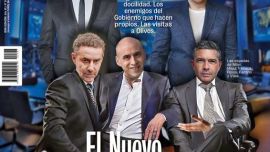Rafael Mariano Grossi of Argentina has been chosen as the new head of the United Nations' nuclear watchdog, succeeding the late Yukiya Amano.
Russia's ambassador to international organisations in Vienna, Mikhail Ulyanov, tweeted Tuesday that the International Atomic Energy Agency's (IAEA) board of governors had selected Grossi as its new director general.
Grossi is Argentina's ambassador to the Vienna-based IAEA. His candidacy enjoyed support from Brazil, a Latin American ally and member of the agency’s board of governors, as well as the United States.
A former IAEA Assistant Director, Grossi's work as a top-level international nuclear diplomat dates back to the 1983-1989 Raúl Alfonsín presidency under the Foreign Ministry’s Nuclear Affairs Director Adolfo Saracho, who pioneered the policies of a democratic Argentina for the peaceful use of nuclear energy.
Three other candidates were nominated for the job back in September, following the July death of former head Yukiya Amano: Cornel Feruta of Romania, its chief coordinator under Amano and the acting director general since his death; Marta Ziakova of Slovakia; and Lassina Zerbo of Burkina Faso.
As the next director, Grossi will wade into some of the thorniest terrain in global relations. The IAEA won a Nobel Peace Prize for debunking false intelligence that led up to the 2003 war in Iraq. Later, it was thrust into disputes in Syria and North Korea as well as international concern over nuclear safety after the Fukushima reactor meltdowns in Japan in 2011.
Today, it's confronted with the unravelling of the 2015 nuclear accord with Iran, which began when US President Donald Trump unilaterally pulled the United States out of the agreement in May 2018.
Grossi is on record as saying inspectors monitoring Iran’s nuclear deal could benefit from more openness. He will likely face US and Israeli pressure to open a new investigation based on documents and nuclear material allegedly discovered in a warehouse in Tehran.
"Uncertainty arises from silence,” Grossi said in a recent interview, explaining his view that IAEA safeguards inspectors should communicate more clearly. He pledged “firm but fair” monitoring and a “constant dialogue” with member governments.
Grossi, 58, was Amano’s deputy at the height of the Iran investigation, travelling to Tehran as part of a team that published a report in November 2011 that detailed Iran’s past nuclear-military activities.
--TIMES/AP



















Comments